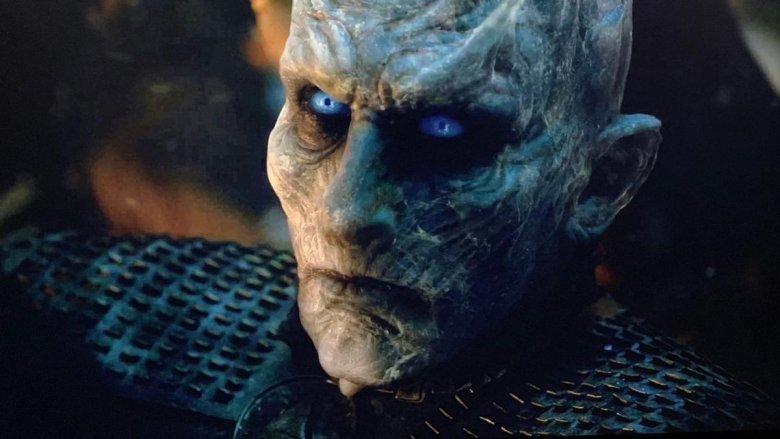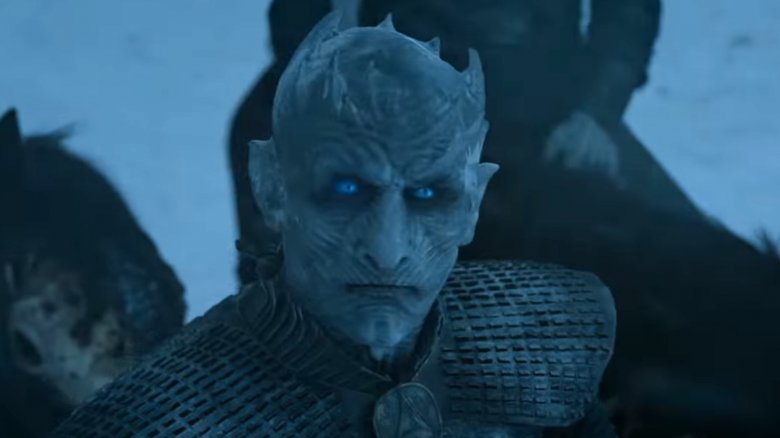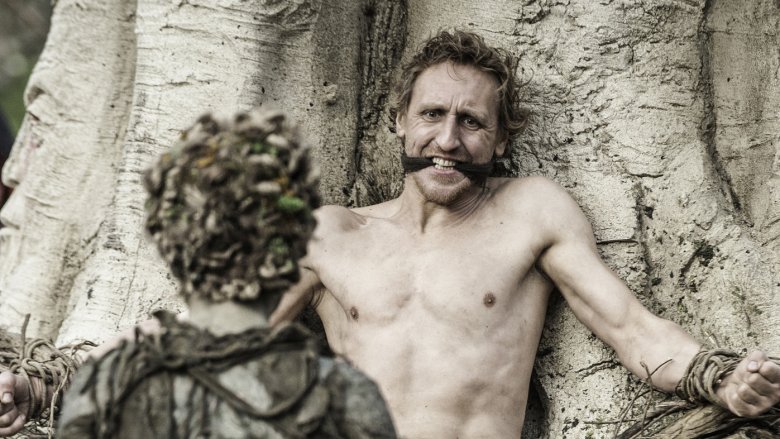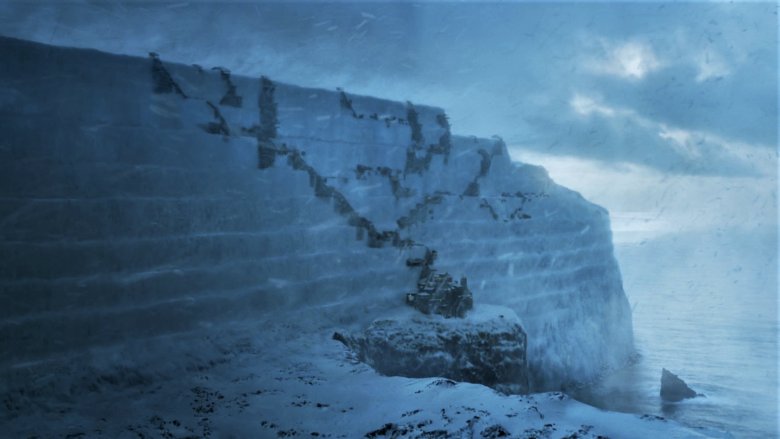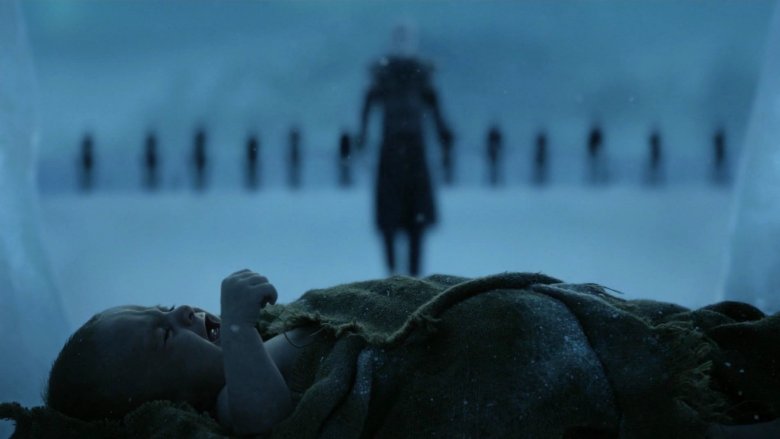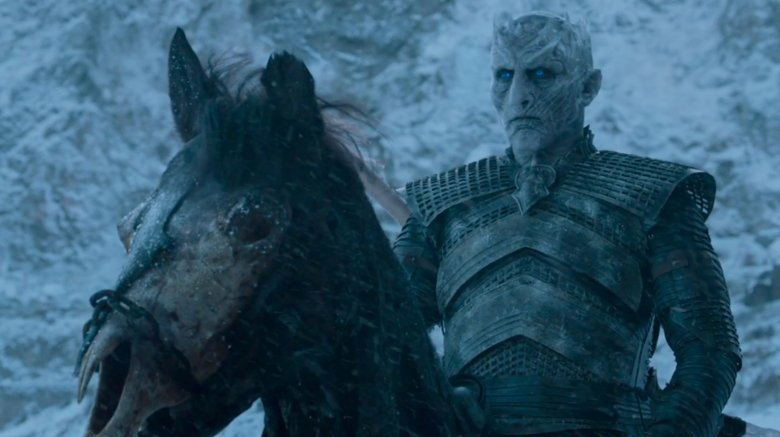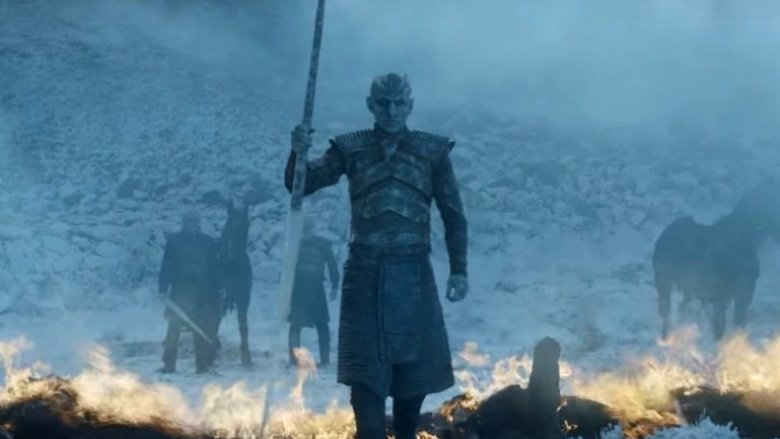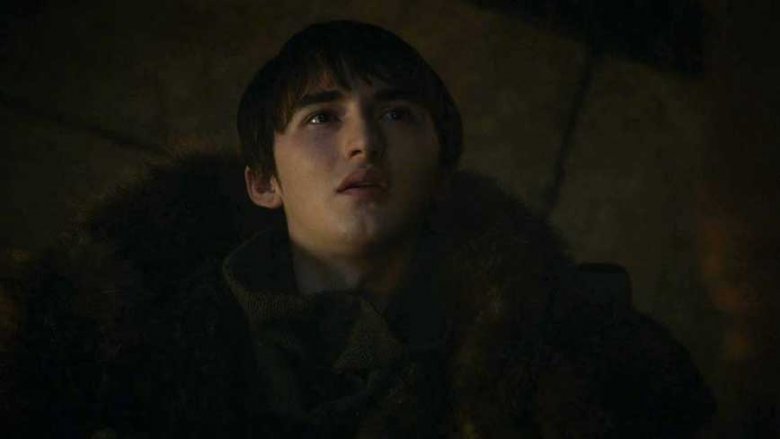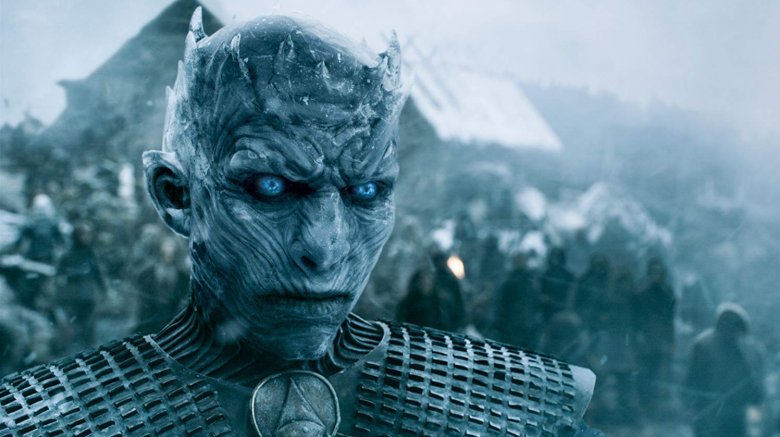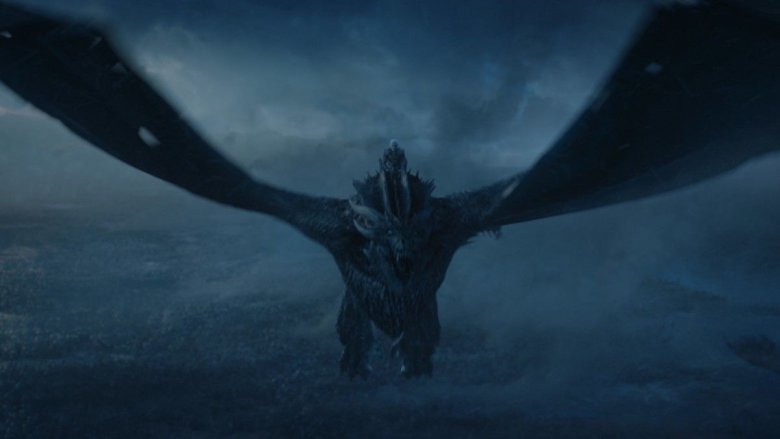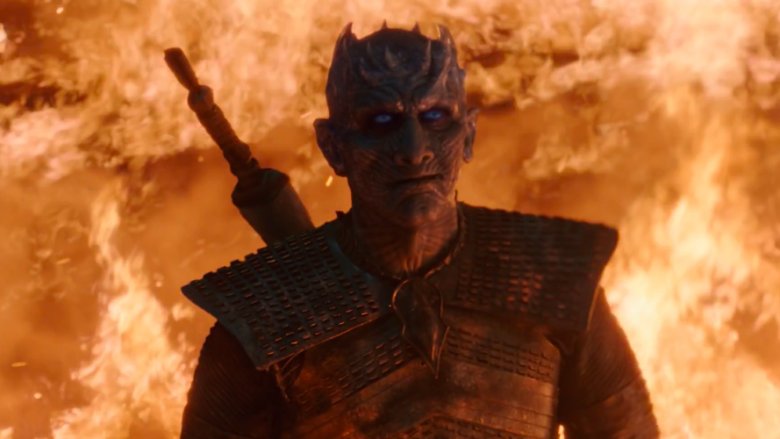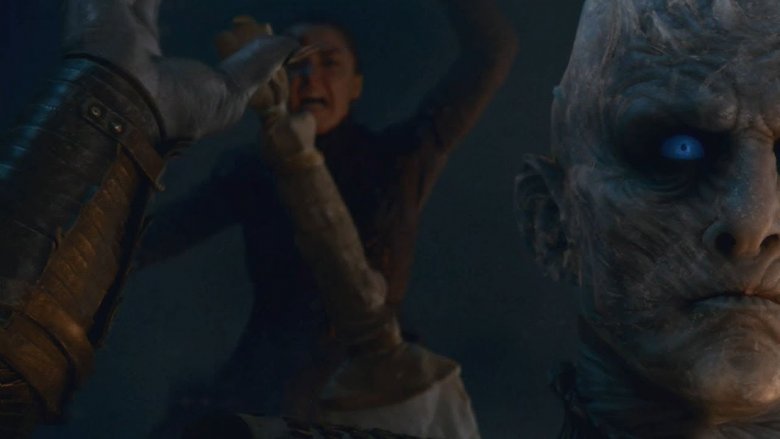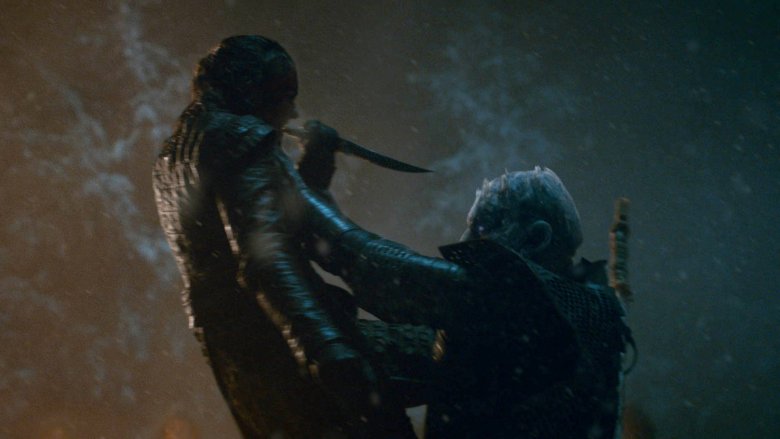The Untold Truth Of The Night King
Game of Thrones is a show built on twisting narratives, complicated world-building, and fantastical elements — think political intrigue, but with dragons. A story this epic needs to have some truly memorable villains; luckily, creators David Benioff and D.B. Weiss have had plenty of options to choose from. Adapted from George R.R. Martin's A Song of Ice and Fire book series, the show has always made it clear that evil can come in any form — human or not — and with villains like Joffrey Baratheon, Ramsay Bolton, and Cersei Lannister working to fight against our heroes, there's never any shortage of conflict.
For every villain mentioned above, there's an in-depth backstory, but one of the series' longest-running bad guys largely remained a mystery to readers and viewers until the HBO series' eighth and final season — specifically The Night King, the ancient creature who created and led the formidable Army of the Dead. We still don't know much about The Night King, but from behind-the-scenes tidbits to fan theories, here's the untold truth of this menacing bad guy. Beware: spoilers for Game of Thrones season 8 ahead!
Played by a stuntman
Slovakian actor Vladimir Furdík might be the most recognizable face of the Night King at this point, but the truth is, he only started playing the character in the show's sixth season — prior to that, the role was played by Richard Brake, best known for films like Batman Begins. Brake and Furdík actually overlapped: while Brake was playing the Night King, Furdík played the high-ranking Walker that Jon Snow (Kit Harington) shatters to pieces with his Valyrian steel sword. The transition between the two actors was so seamless that many may not have noticed, though some fans found Brake's appearance even more frightening.
Furdík was an indispensable part of the Thrones team long before he stepped into the Night King's frozen shoes, working on everything from the fight scene at the Tower of Joy (he was a stunt double for Ser Arthur Dayne) as well as performing and working on everything from high falls to intense sword fights. When it came time to recast the Night King, there was no better choice than Furdík, who clearly knew the show's action set pieces inside and out.
Was once one of the First Men
Though the Night King's human name is never revealed and audiences still don't have a firm handle on his personal history, the show did confirm during season 6 that he was once a human — a member of the group known as the First Men — who was used as a pawn by the Children of the Forest
The Children of the Forest made a home in Westeros long before humans existed, and were settled happily in the Seven Kingdoms until they were forced to deal with the First Men, a group whose descendants can still be found in Westeros (including Ned Stark and his family). After the First Men crossed from Essos into what is now Dorne, they came into conflict with the Children, a large part of which was due to the fact that the First Men regularly cut down weirwood trees which were sacred to the Children. In the end, the Children were responsible for creating the Night King when they took one of the First Men hostage and plunged dragonglass into his heart, inadvertently creating ultimate evil by making the first ever White Walker as a means of defending themselves against men. (The actor who played the human pre-Night King? Vladimir Furdík, of course.)
Unintended consequences
The creation of the Night King turned out to cause more problems than it solved — after all, an undead monster who can raise entire armies of zombies is bound to cause a few regrets. He turned against the Children of the Forest, though his reason for doing so is unexplained (other than, well, the fact that the Children tied him to a tree and transformed him against his will), and they were forced to fight back.
When the First Men and Children of the Forest found themselves under attack by the oncoming threat of White Walkers, the two warring factions were forced to team up and work together to save both; ultimately, the First Men triumphed at the Battle of the Dawn. After the war was over, the First Men worked with giants and the Children to build the now-infamous Wall, and a familiar name was a big part of that process — Bran the Builder, whose actual name was Brandon Stark. Bran was the driving force behind the Wall meant to keep the White Walkers at bay. The Night's Watch was then formally instituted to guard the barrier, while Brandon Stark was declared the first King in the North.
Introduced late in the Game
White Walkers have always been a big part of Thrones' mythology — the show's pilot opened with White Walkers attacking members of the Night's Watch — and long loomed as an ever-present threat, even when Cersei was blowing up Baelor's Sept, Joffrey was chopping off Ned Stark's head and kicking off a land war, or Ramsay Bolton was torturing Theon. Every now and then, during the show's earlier seasons, viewers would be reminded that no matter what else was going on in Westeros, the White Walkers were still out there and ready to attack, from Lord Commander Jeor Mormont's run-in with a wight or the heartstopping moment when Sam Tarly (John Bradley) narrowly escapes being murdered by an oncoming army of Walkers at the end of the show's second season (he later gets his revenge and discovers the usefulness of dragonglass when he slays one in the third season).
For all of these reasons and more, you might think the Night's King had been around for the whole show, but he actually didn't make his first appearance until season four's "Oathkeeper," which finally reveals the fate of the many babies viewers saw offered as sacrifices. During the audience's first-ever glimpse of the Night King, he turns the baby into a Walker, demonstrating his determination to grow his army at all costs.
He had a different arc in the books
Throughout the series, the show has diverged dramatically from the books, especially considering that the source material technically ended about halfway through Thrones' run (Martin's sixth book, the still-unreleased The Winds of Winter, has been highly anticipated for years).
Martin, for his part, has a lot to say about the Night King's history, and especially wants to make sure people don't confuse two figures he sees as especially distinct: the Night's King and the Night King. The Night King audiences know and fear isn't the same being as the Night's King; as Martin has explained, the Night's King is a "legendary figure" akin to Bran the Builder. In the books, he was an early commander of the Night's Watch — specifically the 13th, and considering that at the start of the series Jeor Mormont is the 997th Lord Commander, that's quite a big gap. Thanks to an ill-fated love affair, he turned against the Watch, leading the King Beyond the Wall and the King in the North to band together and take him down. This little piece of punctuation might not seem important, but ultimately, it serves to distinguish two similarly named but radically different characters.
He wants 'revenge' and to 'erase memory'
As the Night King makes his way through the icy North and builds up his army, it remains a mystery as to what he wants beyond destruction, death, and to move beyond the Wall and invade Westeros with the dead. In spite of that inscrutability, Furdík make some executive decisions about his character motivations; throughout the show, hints are dropped about why the Night King is who he is and does what he does.
In various interviews, Furdík has said that he thinks that the Night King wants revenge for being the Night King in the first place — as the result of years of conflict and mistakes, this First Man became the Night King against his will and has spent the rest of his existence trying to fight back against those who wronged him. The show also gave viewers one significant piece of evidence about his motives: in the final season's second episode, "A Knight of the Seven Kingdoms," Bran Stark (Isaac Hempstead-Wright) reveals that the Night King will come for him, as he has for several other Three-Eyed Ravens, because the King's ultimate goal is an "endless night" and erasing all memory, which means he has to get Bran, a living embodiment of the world's history, out of the way first.
The Night Bran?
One of the longest-running theories among Thrones fans argued that, upon Bran's transformation into the all-knowing Three-Eyed Raven, Bran Stark had actually become a part of the Night King himself — albeit in a pretty complicated way. Throughout Bran's training with the previous Raven, he found himself able to "warg" back in time and see previous events, and during one visit to the Army of the Dead, he ended up branded with the Night King's mark — a twist that left some viewers looking for deeper meaning.
One of the most popular theories circulating on this topic suggested that Bran could have warged to the past to prevent the Children of the Forest from creating the Night King — but in doing so, he became trapped within the Night King in some way. An intriguing theory, but now that the Night King has come for Bran and gotten himself murdered in the process, we know it's one that was obviously off the mark.
A Night nobleman
In trying to figure out the Night King's true origins, numerous fans have wondered if he might have come from a noble family like the Lannisters, Boltons, or Tyrells. As far as ancient houses go, Targaryen is certainly one of the oldest around, and many viewers theorized that the Night King might be descended from this royal line thanks to his ability to ride a dragon, as well as his penchant for arranging carnage in spiral patterns to warn the human race of his impending arrival. However, the Targaryen connection is pretty easy to debunk considering the timeline doesn't really allow for it; that theory, while interesting, has been moot for some time.
The more appealing (and believable) theory points to the Night King being a Stark, especially since fans know for sure that the Night King was one of the First Men, from whom the Starks are directly descended. It's possible that there were other Stark ancestors floating around in the First Men, one of whom eventually became the Night King, which explains why he always seems to hunt members of the Stark family in particular — they're his kin, but ultimately turned on him.
The directors didn't give Furdík much to go on
David Benioff, D.B. Weiss, and their cabal of core directors have certainly put plenty of thought into every word spoken and footstep taken on Game of Thrones, and as far as the Night King's journey goes, they clearly had everything planned far in advance. The fact that it was Arya Stark (Maisie Williams), not Jon Snow or another more obvious choice, who would eventually kill the Night King was something the showrunners had planned for several years. As far as the Night King goes, they've been carefully considering this character for a long time.
You might think, that with all the thoughts and plotting the showrunners put into this character, that they might give the actor playing him any insight to his motivations or goals, but that wasn't the case for Vladimir Furdík. In an interview with The Hollywood Reporter, Furdík said that the directors and showrunners didn't "give [him] much," and indicated that since he got the sense that they knew the character inside and out, he didn't necessarily need the same information. No matter what you might think of this approach, it certainly didn't affect the storytelling — or Furdík's beautifully creepy performance.
You're fired
Fire has long been one of the most important weapons deployed against wights, the zombies created by the White Walkers — a body can be reanimated if it isn't incinerated, which is why the burial rites for the Night's Watch involve cremation. Luckily, Daenerys Targaryen (Emilia Clarke) and her team have a vital resource that can help fight against wights and Walkers: dragons, which can soar high above the Walkers and wights, unleashing dragonfire — even more destructive than regular fire.
The Night King obviously has an affinity for these beasts, considering he took down one of Daenerys' dragons during the show's seventh season, turning him into an ice dragon that breathed blue flame, but during "The Long Night," which focused exclusively on the Battle of Winterfell, it became clear that even a living dragon wouldn't be an effective weapon against him. Daenerys, once she got the Night King alone, tried her familiar "dracarys" trick, but the Night King stood there smirking, completely immune to dragonfire. It was clear that something far more destructive than dragonfire needed to be employed to take him down — luckily, that substance was a part of the battle as well.
Night King dethroned
As the Night King and his army advanced on Winterfell, viewers and characters wondered how they'd possibly prevail against an army that could simply continue multiplying throughout the night, and the situation seemed fairly hopeless. The battle itself was relentless, pitting the North against a massive army of the undead (and adding Northerners, Unsullied, and Dothraki alike to their ranks as it raged), and as the Night King made his way to the Godswood to find Bran, viewers felt as if the end was nigh and the Army of the Dead would finally triumph. Even though the Northern squad knew they could destroy the entire army if they only took down the Night King, the chances of them doing that seemed slim at best.
Thankfully, there was one fearless force running around that most viewers forgot about halfway through the episode — specifically Arya, armed with high jumping skills and a dagger of Valyrian steel. As she rushed the Night King and he grabbed her by the throat, it seemed as if her impetuous plan was already ruined, but thanks to a quick hand-switch with her dagger, she took down the Night King. Thanks to years of training as an assassin combined with the element of surprise, Arya was able to use likely the only substance that could take down the Night King, finally ending his surely miserable existence.
One last long night
Even as a professional stuntman, Furdík wasn't immune to the grueling schedule of filming "The Long Night," which required a 55-day shoot over several nights in Belfast that many members of the cast and crew bluntly described as "miserable." When speaking to The Hollywood Reporter, Furdík looked back on the shoot as "one of the hardest jobs of [his] life," compounded by the fact that he worked with most of the actors on their fight choreography as well as performing as the Night King (talk about double duty).
One of the toughest scenes to shoot, understandably, was Furdík's final scene with Maisie Williams as Arya kills him, which Furdík described as "an emotional day and night." He and Williams are good friends and have worked together for years, but the wirework involved for her, combined with the complicated jaw grab Furdík had to execute without injuring Williams, made the sequence especially difficult for everybody involved. In an interview with Variety, Furdík also noted that he worked with Williams on her fight with Gwendoline Christie's Brienne of Tarth, so the two have a strong combat history together — clearly, it paid off with the perfect shot.
